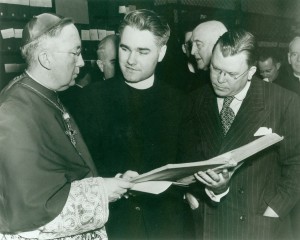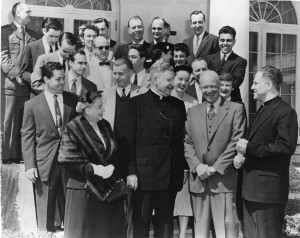
Though there was a museum at The Catholic University of America (CUA) going back to the university’s founding in the late 19th century, the Archives at CUA originated much later as shortly before World War II Msgr. Francis Haas began collecting the papers of important Catholic labor leaders such as Terence Powderly, head of the Knights of Labor (1879-1893), and John Mitchell, president of the United Mine Workers of America (1898-1908). These papers were stored in Mullen Library, but there was no staff to organize nor rooms where researchers might examine them. After the war, history faculty, particularly Rev. John Tracy Ellis, worried that university history and of Catholic Americans generally was being lost through neglect of vital records and papers.
As a result of Ellis’ advocacy, a committee that included Msgr. Edward Jordan (the vice rector), Mr. Eugene Willging (acting director of the library), and Rev. Henry Browne, was formed to establish an archives envisioned as the “memory” of the university, a depository for collection of the nation’s Catholic leaders and important organizations, and a resource for the history of Catholics in the American labor movement. The Archives officially opened on the Feast of the Immaculate Conception (December 8, 1949) in an impressive ceremony that included Wayne Grover, archivist of the United States; Archbishop O’Boyle, chancellor of the university; Ernst Posner, archivist of American University and a seminal theorist of archives; Philip Brooks, president of the Society of American Archivists; and Dr. Guy Ford Stanton, executive director of the American Historical Association (see photograph above). They spoke of the importance of archives in the preservation of culture, and, specifically, of the Catholic Church’s long tradition as a keeper of historical records.
The Archives developed quickly in its first decades under the leadership of distinguished historians Rev. Browne and Msgr. Robert Trisco. Through their work and that of their successors, particularly Drs. Anthony Zito and Timothy J. Meagher, the Archives has grown to include nearly 14,000 feet of records and manuscripts (not including the museum collection). As the official depository for such organizations as the National Catholic Education Association (NCEA), Catholic Charities USA, and most importantly, the United States Conference of Catholic Bishops (USCCB), CUA is unrivaled as a source for the history of American Catholic institutions in the 20th century. In addition, CUA has the personal papers of several of the 20th century’s most distinguished American Catholic thinkers: social theorists Msgrs. John A. Ryan and Paul Hanly Furfey, anthropologist Msgr. John Montgomery Cooper, and historians Msgrs. John Tracy Ellis and Peter Guilday. Labor history, an original focus of the archives, remains an important strength with collection such as the papers of Philip Murray, president of the Congress of Industrial Organizations (CIO); John Brophy, national director of the CIO; and Richard Deverall, labor activist who participated in the reconstruction of Japan after World War II (see labor collections subject guide).

The Archives, known for many years as the Department of Archives, Manuscripts, and Museum Collections (see 1985 brochure), and since 2002 as the American Catholic History Research Center and University Archives (see current brochure), endures as the institutional memory of CUA, especially in preserving notable events in CUA’s history such as visits by U.S. presidents and popes.
Additionally, there are records of CUA’s board of trustees, rectors and presidents, and vice presidents; records of university departments; personal papers of critical leaders from Bishop Thomas J. Shahan, fourth rector of the university, to Dr. C. Joseph Neusse, sociologist, historian of the university; and campus publications such as the Tower student newspaper and the Cardinal yearbook.
For more information, see the Archives main web site and also an article about building the collections.
